Subscribe to our newsletter
How is UK Funding Allocated to Support Sustainability Research?
A year on from the launch of our Contextualizing Sustainable Development Research report, we continue to dive into the data demonstrating research trends around the UN’s Sustainable Development Goals (SDGs). This month, Dr Juergen Wastl, Dr Briony Fane and Bo Alroe take a look at the distribution of UKRI grant funding supporting sustainability research.
Juergen Wastl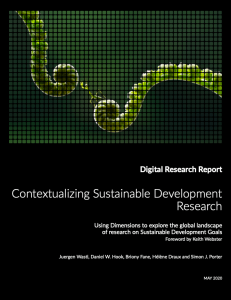 is Director of Academic Relations and Consultancy at Digital Science. He previously headed up the Research Information team at the University of Cambridge’s Research Strategy Office and worked for BASF managing BMBF-funded projects internationally. Briony Fane is a Research Analyst at Digital Science. She has a higher education background, having gained a PhD from City, University of London, and has worked as both a researcher and a research manager. Bo Alroe has worked with research management and administration since 2004, and currently as Director of Strategy with Digital Science. Bo is from Aalborg, Denmark, where he studied and currently lives with his family.
is Director of Academic Relations and Consultancy at Digital Science. He previously headed up the Research Information team at the University of Cambridge’s Research Strategy Office and worked for BASF managing BMBF-funded projects internationally. Briony Fane is a Research Analyst at Digital Science. She has a higher education background, having gained a PhD from City, University of London, and has worked as both a researcher and a research manager. Bo Alroe has worked with research management and administration since 2004, and currently as Director of Strategy with Digital Science. Bo is from Aalborg, Denmark, where he studied and currently lives with his family.
Introduction
The United Nations Sustainable Development Goals (UN SDGs) are global targets set by the UN across 17 areas that will give rise to a better and more sustainable world for all. Research relating to these SDGs can therefore be seen as socially impactful, and analysing trends in SDG-related research can indicate how a researcher, institution, funder or country is contributing to meeting these targets.
Continuing our SDG blog series, this blog focuses on insights in SDG related allocation of research funding related to the SDGs. Having broadened its categorisation of grants data to include classification by SDG codes, we can use Dimensions to gain insights into how competitive funding supports the Goals. By applying Dimensions’ SDG classifications to its grants database, we discovered over 6 million grants worth more than £1.37 trillion, from over 600 funders worldwide that can be searched and analysed. We took a dive into the data to discover which UK research councils support SDG-related research, where funding is focused across the UN SDGs, how much is allocated to sustainability research, and more.
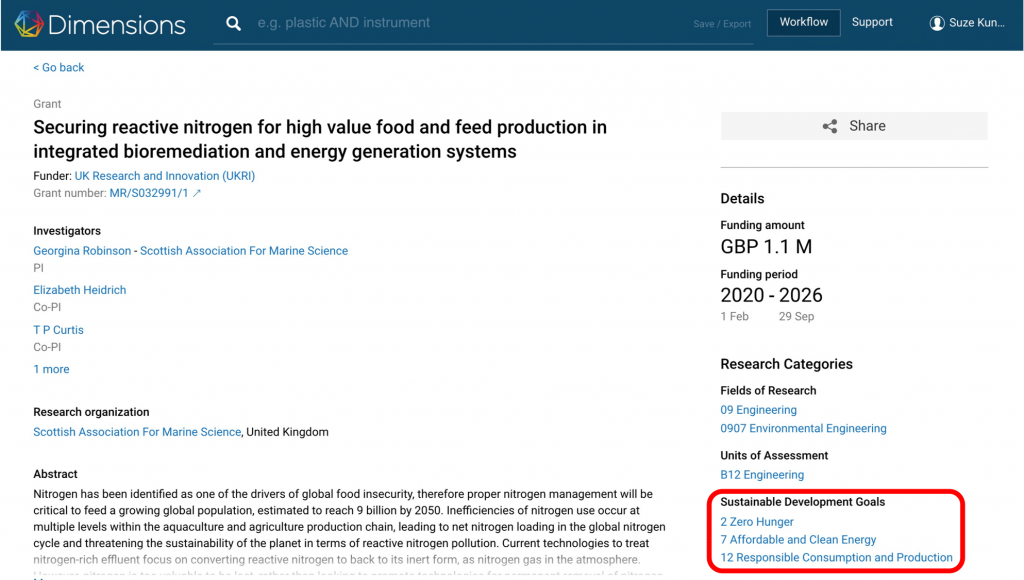
Figure 1: A Dimensions screenshot showing how a single grant can be assigned multiple SDG classifications; SDGs 2, 7, and 12 in this instance
How much UKRI funding supports SDG-related research?
Dimensions’ classification system was developed jointly with the Dutch universities (via the Association of Universities in the Netherlands, VSNU), SpringerNature, and Digital Science. The aim was not only to design a classification system that can categorise grants that mentioned sustainability or the UN’s work but also to assign SDG classifications to research – including grants and publications – to better support the goal of sustainability. Supervised machine learning was used to classify content in Dimensions. For a publication abstract or grant to merely mention sustainability or related concepts such as ‘pollution’ would not be enough to earn an SDG classification. This means that Dimensions can identify grants that support sustainability improvements both explicitly – eg, by mentioning the UN’s sustainable development goals – and implicitly.
After extracting all UKRI grants indexed in Dimensions from eight UK research councils between 2011-2020, we applied the SDG classification to determine the proportion of UKRI funding that supports the SDGs.
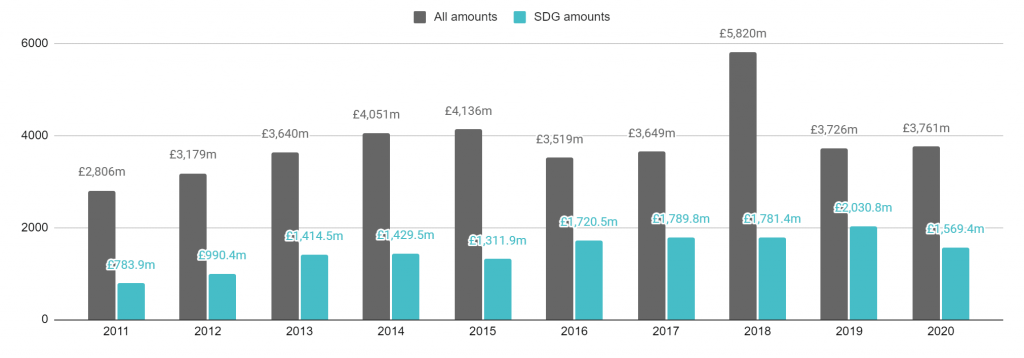
Figure 2: The sum in GBP of SDG-classified UKRI grants awarded between 2011 and 2020
By applying the 17 SDG-classified grants records and publications in Dimensions, we can evaluate how funders support research towards more sustainable development. Figure 2 provides an overview of the sum in GBP of UKRI grants that have supported sustainable development research between 2011 and 2020. We have selected a public research funder as an exemplar for this analysis on the basis that a competitive public research funder, such as UKRI, is the origin of most public research funding in the UK, with arguably the most impactful strategic waypoint for research on sustainable development. Such funders have considerable influence on the type and focus of research conducted.
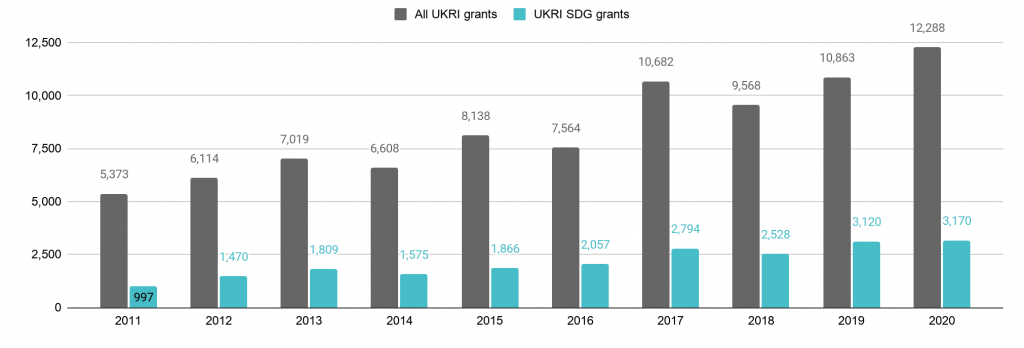
Figure 3: The total number of UKRI grants with and without an SDG classification awarded between 2011 and 2020
Figure 3 shows the total number of SDG-related UKRI grants versus all UKRI grants, using the same base data as for Figure 2. There is a notable increase in the number of grants awarded after 2016, the year the UN SDGs were implemented. The graph also reveals that an average of 24.9% of all UKRI grants each year aimed to support sustainable development research, with a growth rate of 218.0% over the period. This is a higher rate than for all UKRI grants in the period, which was 128% over the same period. The Global Challenges Research Fund (GCRF) UK aid strategy is administered through UKRI and aims to assist in making progress on the global effort to address the UN SDGs. It has committed £1.5bn funding to address the UN SDGs between 2016 and 2021. This has also contributed to both the number and value of grants for research with a focus on sustainability.
Unlike Figure 3, Figure 2 does not show a similar trend for awarded amounts. This could indicate an increased number of smaller sums of funding per grant awarded by UKRI.
The proportion of UKRI funding with SDG classifications by year shows an approximately linear growth, with SDG funding having almost tripled in 2020 compared to 2011. This trend is very likely to continue and we may see an even greater increase in funding as we move towards the 2030 deadline of achieving the Goals, especially as UKRI have committed to supporting the ambitions of the UK government’s aid strategy and progressing the UN SDGs1. If and how the recent adjustments to GCRF funding by the UK government will affect the grant landscape and visibility remains to be seen.
How is sustainability research funding distributed across the 17 SDGs?
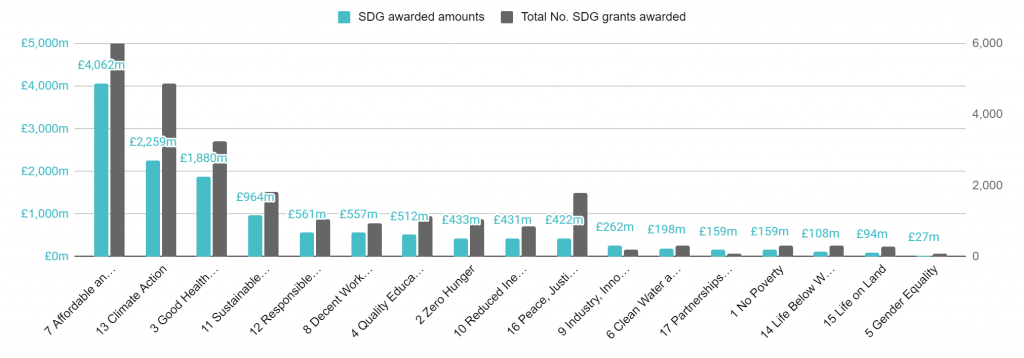
Figure 4: The value and number of UKRI grants awarded by SDG classification between 2011 and 2020
 Figure 4 sheds light on the focus of UKRI’s funding in support of the UN 2030 Agenda. The graph shows the total SDG funding amounts by the total number of SDG grants awarded, as classified in Dimensions. It is clear that SDG7, ’Affordable and Clean Energy’, appears to have been prioritised as a funding objective. It has the greatest number of grants awarded and the highest total funding amount compared to other SDGs over the 10-year period. Similarly SDG13, ‘Climate Action’, is also prioritised. Given the climate crisis we face and the role that energy has to play in this, it makes sense that increased funding would be focused in these areas, as the transition towards reaching climate neutrality is now so urgent.
Figure 4 sheds light on the focus of UKRI’s funding in support of the UN 2030 Agenda. The graph shows the total SDG funding amounts by the total number of SDG grants awarded, as classified in Dimensions. It is clear that SDG7, ’Affordable and Clean Energy’, appears to have been prioritised as a funding objective. It has the greatest number of grants awarded and the highest total funding amount compared to other SDGs over the 10-year period. Similarly SDG13, ‘Climate Action’, is also prioritised. Given the climate crisis we face and the role that energy has to play in this, it makes sense that increased funding would be focused in these areas, as the transition towards reaching climate neutrality is now so urgent.

How is funding split across the three pillars of sustainability; societal, environmental, and economic?
We can analyse SDG-related UKRI funding in Dimensions through the lens of the three pillars of sustainability (societal, environmental and economic, also depicted as the ‘wedding cake’, as seen in a previous blog) as a means of assessing the proportion of UKRI research funding that is concentrated in these three components.
Figure 5 visualises the prioritisation of UKRI’s sustainability research funding by each pillar of sustainability. The size of each circle is directly proportional to the total amount of funding that has been awarded to support the SDGs within each pillar. The big hitters in the Social pillar are SDG7, ‘Affordable and Green Energy’, and SDG3, ‘Good Health and Well Being’. In the Environmental Pillar funding is prioritised in SDG13, ‘Climate Action’, and for the Economic Pillar SDG8, ‘Decent Work and Economic Growth’, and SDG12, ‘Responsible Consumption and Production’, are the most highly funded research areas.
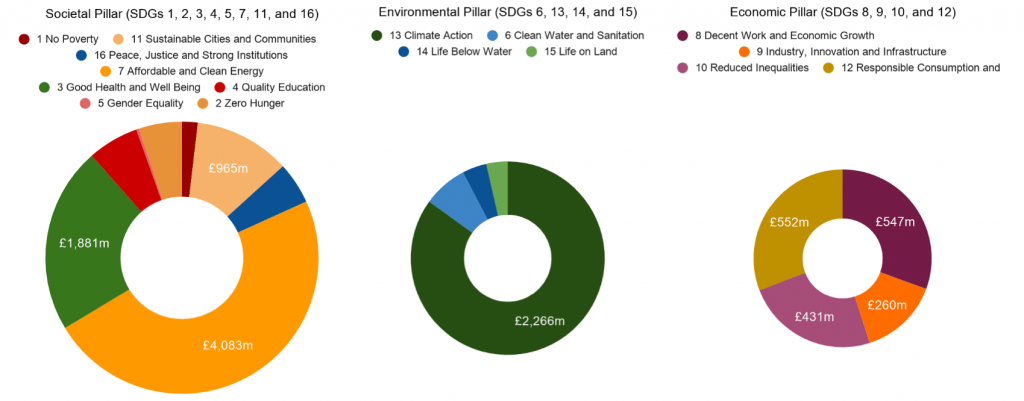
Figure 5: The value of UKRI’s sustainability research funding between 2011 and 2020, split by the three pillars of sustainability; societal, environmental and economic sustainability
Conclusion
UKRI has allocated close to £10 billion or 28% of all its awards from 2011 to 2020 in ways that would offer support to the SDGs. Grants appear to be more likely than publications to receive SDG classifications. One reason for this is that a grant abstract is more focused on what needs to be achieved and the intention behind the funding, while a publication is reporting on what has been achieved, which may not be as comprehensive in terms of its SDG focus. Our showcasing of the grants data here shows how this funding has been allocated to each of the SDGs.
This blog shows that funding research aligning with sustainable development is prominent on UKRI’s funding programme agenda and that research capacity in this area is growing. With research and innovation having such a vital role to play in helping to find sustainable solutions to address global challenges, it is reassuring to see that SDG related research by a competitive funder is so extensive. It is also particularly gratifying to see that all 17 Goals are included to some extent in UKRI funding.
References
1: UKRI announces International Development Research Programme Awards
